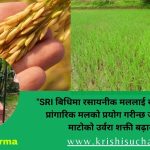Problem to seed sector and solution in the present scenario of Covid-19

Seeds are the fundamental thing for the establishment of plant population and said that a quality seed assist in higher emergence rate with producing a good quality crop. However, scientifically seed is a matured ovule covered with seed coat that form the basis of plant growth. In other word a propagating material used in Agriculture, Sericulture, Silviculture and horticultural plants. Thus, seed is the most vital and crucial input for crop production and nowadays, more seed are used for propagation in both soiled and soilless media. Seeds have always been the ingredient in the establishment, expansion, diversification and improvement of crop production.
Compared to the vegetative propagules used for propagation, seeds are the very most reliable source that can be used, stored, transported and adapted in almost every possible environment. Though various vegetative propagules give higher yield, seeds are the mostly used planting materials as they are used since past, easily available and don’t need high tech knowledge in growing and using them. It is said that one should protect head in crowd and the seed in famine, so seed is considered as the basis for the food and foundation. These days the COVID-19 pandemic has affected the world, an ongoing pandemic of corona virus and due to which the production, distribution and consumption of food products have been affected throughout the whole world.
The pandemic is becoming even more severe with the increase in number of cases day by day resulting in declined farm activities and stagnation of harvested products. Further, during the peak harvest, the produce could not reach markets, thus disrupting the supply chain. Also,the unavailability of migrant laborers, intercepting the harvest and post-harvest operations. The pandemic has given rise to several challenges in procurement operations as well. The agricultural sector is the highest employer in Nepal at 66% of the population, though this figure includes a very diverse array of quality of jobs that includes everything from subsistence to (small-scale) enterprise farming and wage-employment that is seasonal and part-time to permanent. COVID-19 is putting Nepal’s small- scale producers and landless farmers under strain. Among those various sectors even within the agriculture, seed sector has been affected excessively too. Mainly, private seed organizations are on halt because of the urge of lockdown.
As a key agricultural input, seeds play a fundamental role in developing the resilient agricultural sectors and food systems that underpin food security and nutrition, and support the livelihoods of farmers and other actors in the value chain.
The seed industry is truly globalised: A seed lot can be expected to travel through several countries for multiplication, production, processing and packaging before it reaches a farmer. It is also time sensitive, with defined periods for sowing and harvesting different crops. As such, the necessary restrictions on movement and transport put in place by governments to protect their people from COVID-19 have the potential to seriously affect the production, certification, distribution and cost of seed.
Although many countries are working to keep borders open and trade flowing, a number of issues are emerging related to the business of trade. The increased cost of air transport due to the reduced availability of commercial flights may hamper seed supply chains and on-time delivery of seed. Limits on the mobility of people are affecting a variety of production, trade and sales processes.
In addition, delays at borders due to stricter safety measures and fewer personnel are affecting timings and costs. Depending on how long the pandemic and associated confinement measures continue, the seed sector and its associated supply chains could feel the impact of COVID-19 long into the future.
With the inter linkage between the food security and seed security, due to the ongoing pandemic the food security is in risk so as seed security. As the border are closed and the reserve seed are being used there is certain that there will be seed limitation. Some farmers at local level preserve cereals seeds but not vegetables seeds for upcoming season so, the vegetables seed are ought to be highly demanded in this pandemic. The framework for seed supply chain in Nepal has completely broken off during this period. That’s why, one of the popularly viewed solutions for solving food insecurity during this pandemic of COVID-19 is: Availability of Quality Seeds.
Problems in seed sectors are:
1) Nepalese market is under the domination of global seed business and seed import is continuously rising.
2) Demand of hybrid seeds is soaring in the Nepalese market due to their high production potential.
3) Easier access to open pollinated seeds is easier in the international market than the domestic market.
4) Lagging behind in conserving diverse genetic resources, utilizing available resources in developing appropriate varieties and producing their seeds.
5) Piling up of quality seeds by immature seed companies for immoral activities has also been seen to cause unregulated seed distribution without following seed policy of Nepal, distorting production ability of potential sectors, regions.
6) The main problem to be considered during this scarcity is volatile market, where the price fluctuation was common during the beginning of COVID-19 cases in Nepal.
Solution to be focused to terminate the problems:
1)Reducing import is not possible without developing suitable hybrid and open pollinated varieties of different crops according to farmers’ choice, and making their seeds available when and where needed.
2) Import substitution, and export promotion of good quality seeds, by working as per guidelines of National Seed Vision (2013 – 2025).
3) Use of high-quality seeds and that too produced in Nepal to replace the excessive imports plays important role to attain success in agriculture production.
4) Encouraging Farmers for Seed Replacement.
5) Providing Seeds on Kit box as Relief Package.
6) Launching of Seed NL in Nepal.
7) Increased Seed Storing Facilities.
8) Increase in association with international companies.
9) Following of National legislation on Seed Sector by Informal system.
10) Digitalization on Seed Sector.
11) Usage of the micro-climatic condition in integration with workshops training.
Writer: Smriti Pandey (Student, Bsc. Ag IAAS Paklihawa Campus)

 दिल्लीको होटलमा बसेर क्यानडा र अमेरिकामा मानव तस्करी
दिल्लीको होटलमा बसेर क्यानडा र अमेरिकामा मानव तस्करी  अनलाइन जुवा खेलाएर काभ्रेका अनिलले गरे दुई अर्बको कारोबार
अनलाइन जुवा खेलाएर काभ्रेका अनिलले गरे दुई अर्बको कारोबार  मुख्यमन्त्री सोडारीले विश्वासको मत लिन सुदूरपश्चिमको प्रदेश सभा बैठक आव्हान
मुख्यमन्त्री सोडारीले विश्वासको मत लिन सुदूरपश्चिमको प्रदेश सभा बैठक आव्हान  अफगानिस्तानमा बाढीबाट ३१५ भन्दा बढीको मृत्यु
अफगानिस्तानमा बाढीबाट ३१५ भन्दा बढीको मृत्यु  सुँगुरको मिर्गौला प्रत्यारोपण गरिएका रिचर्डको निधन
सुँगुरको मिर्गौला प्रत्यारोपण गरिएका रिचर्डको निधन 


